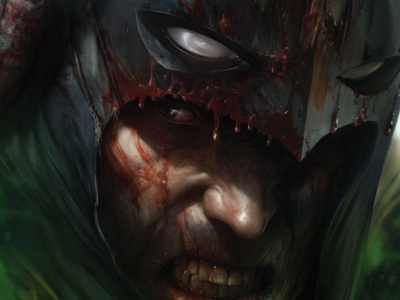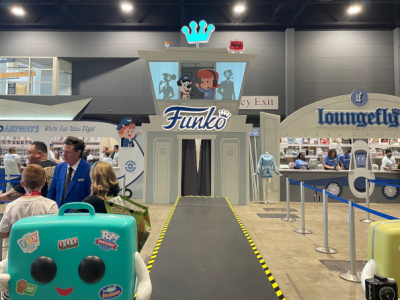 We recently caught up with IDW CEO Ted Adams for a chat about the state of the market, IDW’s line, and the digital market for comics. In Part 2, we talk about IDW’s diverse line. In Part 3, we talk about the market for digital comics and IDW's digital initiatives. In Part 1, we talked about the state of the comic and graphic novel markets and IDW’s place in them.
We recently caught up with IDW CEO Ted Adams for a chat about the state of the market, IDW’s line, and the digital market for comics. In Part 2, we talk about IDW’s diverse line. In Part 3, we talk about the market for digital comics and IDW's digital initiatives. In Part 1, we talked about the state of the comic and graphic novel markets and IDW’s place in them.It seemed like you took different approaches to your licensed properties last year. What would you say you learned from your experience with those high profile properties in 2009?
The main thing we’ve learned is that the more that we can tie them into the underlying entertainment the better the consumer likes that kind of product. Star Trek Countdown, which was the prequel to the Star Trek movie, was one of our best selling books last year. That was co-plotted by the guys who wrote the movie and we’re a really integral part. The only place to get the true back story on the villain from the movie was in our book.
It was really clear that consumers responded to that in a big way.
If you look at some of our other big licensed books, things like Angel, it’s really creating storylines that are important and impactful to the people who love the show. The key to that is, as much as we can, making it feel like it is an official part of the TV show. If you look at things like Transformers and G.I. Joe I think we really raised the bar creatively. We had a new editorial team that came in and just did a great job. If you look at things like G.I. Joe Cobra which was one of our most critically acclaimed series last year, it’s a really terrific comic book. If you like G.I. Joe it’s a book that you’ll really like. Even if you’re not necessarily all that familiar with the G.I. Joe characters it’s just a great comic book.
You mentioned tying to the storyline of the core property was a key in having successful licensed comics. It used to be that either you had a straight adaptation of a media property or you had a completely independent storyline. Now it seems like the trend is more toward integrated storylines like your prequel, and more of this attempt to tell stories across multiple platforms and engage the consumer in all these different media. Can you talk a little bit about what you’re seeing in terms of the change in that kind of story telling for licensed comics?
The biggest change there is that the license holders themselves, the rights holders, now see this as a legitimate way to tell pieces of the story that they aren’t going to be able to include in the movie or the TV show. Because comics every year are a little more legitimate than the year before, they’re now just seen as another way to tell stories that they couldn’t tell otherwise. I’m drawing a complete blank on it--but there’s an actual word for what you’re talking about--
Transmedia storytelling.
Thank you yes, transmedia storytelling. It’s now got its own catchphrase. Five years ago we had to try and convince people that this is something they would want to do and now there’s a whole new word for it that we can throw out there. It’s just become part of the storytelling for movie studios and licensors in general.
One of the things we’ve been kind of surprised about in terms of your output over the last year or two has been the appetite for your strip reprints. Some of these properties are things that we’ve seen published in various formats for twenty or thirty years to varying degrees of success. You’ve seemed to have found a way to put them out to a higher degree of success than has been the case in the past, in some cases at least. To what do you attribute that?
It honestly just comes down to the quality. All those books are put together by Dean Mullaney who runs and owns the Library of American Comics. The quality of the work that he’s doing sort of finds an audience on its own. We’ve reached a point where there are probably people who like what Dean’s doing so much that they’re willing to take a chance on a strip that they may not have even heard of before. It really is just a testament to the line that Dean’s put together more than anything.
It started with Dick Tracy which was a book that we did internally. Dick Tracy was a well-enough known character that those books could support themselves because they bought the Dick Tracy brand. As we’ve branched out into all the things that Dean’s done for us, it’s just much more reflective of the work that he’s doing and bringing an audience to his books as much as his underlying properties themselves.
We just published a book with Dean called King Aroo which is in the Library of American Comics. It was a strip I wasn’t familiar with personally. It was something Dean was really passionate about and wanted to do. It’s just an amazing book. I think that book is a perfect example where King Aroo, that strip itself may not be all that well known but under Dean’s imprint it will find an audience because of the work that Dean’s done.
That relationship that you have with Dean, you’ve got him sort of doing your strip stuff, you’ve got a relationship with Craig Yoe now who’s doing his thing. Is this a model of how you’re set up as a publishing company, with people bringing in different categories of content for you on an editor basis or packaging?
It’s certainly one of our models. One of the things that I like about IDW is that we are a really diverse publisher and we work in a variety of ways. Having people simply bring us imprints is one way of working. We’ve got of course Dean’s Library of American Comics; the Yoe books, which are really exciting; we’re also the publisher for ComicMix which is Mike Gold’s Web-based imprint. We’ve been doing books with Scott Christian Sava’s all-ages Blue Dream Studios.
We also have a fully staffed editorial team so we’re also creating plenty of books in house, everything from creator-owned books to the licensed books. Our editorial team is really what does set us apart from our peers. I really feel like IDW’s in house editorial team is the best in the business.
What are you most excited about coming from IDW in 2010?
For 2010, we’re very excited about a wide array of books across many genres. For fans of our Library of American Comics strip reprints, we’ve got more Bloom County as well as new collections that run the gamut from King Aroo to Li’l Abner to Blondie and more. Along those lines, our partnership with Archie Comics kicks off this year with reprints of the classic Bob Montana strip and some deluxe comic collections as well. Partnerships with Craig Yoe and Joe Pruettt’s Desperado Studio will yield some other great art books and deluxe collections, too.
On the comic book front, we’ve got in development literary projects with beloved, best-selling writers like James Patterson, Peter S. Beagle, Robert Bloch, and Mario Acevedo, as well as a second Richard Stark project by Darwyn Cooke. We’re working on a relaunch of a couple classic movie franchises, a big crossover with 30 Days of Night; we have a couple of huge announcements in the works for some spring comic conventions, and are even putting together the very first IDW ‘event’ for later this year, too. And rounding out what we feel is a very well-rounded slate of things that we’re able to talk about now, we’re helping re-launch Famous Monsters of Filmland in July, which has us as excited as all the other fans of that magazine.
Click here for Part 3.







